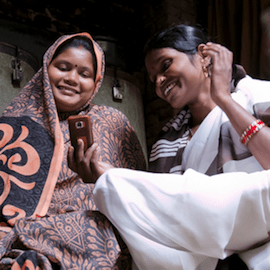No Light at the End of the Tunnel: Why Social Entrepreneurs Are Susceptible to Burnout – And How They Can Prevent It
Starting a business is hard. The costs are high, uncertainty abounds and the workload is relentless. New entrepreneurs face these challenges in any industry they enter, whether it be opening a new restaurant or heading up their own consulting firm. Nowhere are these obstacles more apparent than in the startup world, where the path from point A to point B is most poorly lit and there are fewer resources available – both physical and human – to help you reach your destination. Technology startups are most often associated with these types of challenges, but they are not the only example. Social enterprise startups also face the same challenges, and they must find the skills and tools available to overcome these obstacles and succeed.
Both technology and social enterprise startups share a wealth of pros and cons. On the one hand, both are exciting industries where innovation happens on a daily basis. Work often does not feel like work when each day is new and full of intriguing activities like product development, market disruption or improving social welfare. For that reason, technology and social enterprise workers may find that the long, grueling hours that characterize startup culture seem more manageable and worthwhile. Nevertheless, an innovative organization cannot completely counterbalance the struggles of a seemingly endless workload or an ever-expanding set of problems that need resolution. Employees are often asked to work outside their comfort zones, serving multiple roles in a company comprised of only a handful of workers. Along with wearing multiple hats, startup workers are expected to maintain a high work ethic – even though initial pay is lower than the industry standard, especially for the typical high-skilled worker who works at these enterprises.
The Differences Between Tech Startups and Social Enterprises
That is where the similarities between tech and social startups end. For technology startups, all of these challenges are made bearable by the promise of a light at the end of the tunnel. This light – the possibility of benefiting from a public sale or an acquisition of your company – can be the future goal that keeps employees motivated when working long hours or when major challenges arise. Participating in a startup that gets bought out or begins public trading often nets more money for its founding members than a normal salary at an established firm would have provided. This may offer tech entrepreneurs the opportunity to escape the “tunnel” entirely and work on another project or take a break from the high-intensity workload.
In contrast, there is no light at the end of the tunnel for social enterprise startups. Big firms like Google rarely acquire social enterprises, and examples of an IPO are rare. For these social entrepreneurs, the work is never done; there are always more places to expand and more people to help. They are trying to combat poverty and other social issues, after all. And as one guest on the Finding Impact podcast – where I work as a writer – admitted, without this light, there is no end to the unsustainable work rate typical of startup culture.
These are not the only challenges that make the tunnel for social enterprise startups feel longer and more grueling than it does for their tech counterparts. For one, investment firms more readily provide funding to tech startups than social enterprises. For example, look at Fiona Mungai’s conversation with Finding Impact, in which she discussed the challenges social enterprise startups face in East Africa. Technology startups can headquarter themselves anywhere in the world, and many of them decide to set up in Silicon Valley or other tech hubs where venture capital and human capital are plentiful. In contrast, social entrepreneurs must work in or near the communities they serve. Operating out of a region like East Africa where venture capital is sparse, social enterprise startups are forced to build relationships abroad to raise the capital needed to operate in the communities where they work. Therefore, even the initial fundraising required to launch a business is more challenging for social entrepreneurs than technology startups.
Social enterprises also face conflicting priorities in delivering their products to consumers. For tech companies, the incentives are aligned: The more a startup disrupts, the more money it makes. They are free to charge as much as the market will bear. Plus, their work often begins in wealthier places like the United States and Europe, and they enter developing markets only after firmly establishing themselves in the developed world. In contrast, social enterprise startups begin operating in the developing world and are forced to balance profit and impact. Raising prices might hurt the communities their products are designed to help. At the same time, many social enterprises are for-profit endeavors, and earning money is crucial to expanding their business.
The consistent challenge – and the most acute difference between tech and social enterprise startups – is the lack of a light at the end of the tunnel. Without that light, the risk of burnout in social entrepreneurship is high. In fact, several of the conversations we’ve featured at Finding Impact have revolved around the risk of burnout caused by constantly operating at a startup pace. The fact of the matter is the light at the end of the tunnel will always remain distant when impact is the goal; poverty, lack of healthcare, environmental degradation and other social problems will not be eradicated in the foreseeable future.
How Social Entrepreneurs Can Avoid Burnout
Still, these challenges are not insurmountable and, in fact, have been resolved many times before by hundreds of social enterprise startups. To avoid burnout, social entrepreneurs must prepare themselves and their startups for the long-term endeavor ahead. Here are a few ways they can manage this successfully, according to some of the entrepreneurs we’ve talked to on our podcast:
Invest in your organization’s culture: Grant Brooke of Twiga Foods recommends establishing a strong culture by continually demonstrating to employees that you value their contributions to the firm. To that end, social entrepreneurs should emulate strategies employed by many tech startups that offer their new hires competitive salaries, good work-life balance and creative freedom in their roles. When employees feel valued, they are more likely to help foster a positive culture and create a virtuous cycle of mutual support when the inevitable challenges arise. Brooke also encourages social enterprises to develop a culture of trust, which will go a long way in preventing burnout. He’s not alone in valuing culture. Julienne Oyler of African Entrepreneur Collective often reminds people of a quote by Peter Drucker: “Culture eats strategy.” As Oyler describes it, the quote means that culture is as important – if not more important – than a company’s strategy. Even the best strategies require employees to implement them, and a culture that values employees is one that prevents burnout and keeps employees engaged throughout the long tunnel of a startup’s development.
Don’t neglect your own self-care: Similar to investing in the care of employees, social entrepreneurs need to invest in self-care. Self-care is always important, and it becomes even more important when employees look to you for direction and leadership. In some cases, you may be one of just two or three people at the startup, and investing in culture is synonymous with investing in your own care and ensuring you don’t burn out. Each person has their own definition of self-care, such as exercise, family time, sleep/diet, etc. Still, there are some keys to preventing burnout that are applicable to all social entrepreneurs. For instance, Cellulant co-founder Ken Njoroge counsels all social enterprise startups to remember their “why”: that they are working to help improve people’s lives around the world. When you are grinding your way through the long and dark tunnel of building a business, it’s imperative to remember why you wake up every morning to do what you do. Remembering your why will also help keep your priorities in order as your social enterprise expands. However you approach it, self-care should not just be a one-time activity; it must be a continual priority as you navigate the long tunnel of running a startup.
Maintain strong relationships: Ilaina Rabbat of Amani Institute suffered burnout herself, and she wants to encourage her fellow entrepreneurs not just to survive but to thrive. In her experience, social entrepreneurs place themselves in a binary trap between their startup and their friends and family. They feel that time spent with friends and family is time lost on investing in their startup’s success. This causes social entrepreneurs to sacrifice time with the most important people in their lives in order to continue working. According to Rabbat, this leads to burnout as they gradually lose access to the support systems that help them recharge their batteries and stay grounded. To avoid this trap and move from surviving to thriving, she encourages entrepreneurs to practice self-awareness, invest in their relationships, and similar to Ken Njoroge’s advice, remind themselves of their intrinsic motivation.
These are just some examples of ways social entrepreneurs can steel themselves and their startups for the long road ahead. The work is immensely important and improves people’s lives on a daily basis, but it’s often hard and exhausting. Social entrepreneurs must take care of themselves and their organizations as they continue to mature because the tunnel will inevitably be long and the light far in the distance. If they take the right steps, these entrepreneurs can not only create thriving and impactful businesses, they can avoid burnout and achieve long-term personal and professional fulfillment.
Sam Alhadeff is the lead writer for Finding Impact, a website and podcast dedicated to supporting social entrepreneurs in navigating international development.
Photo courtesy of silviarita.
- Categories
- Social Enterprise



